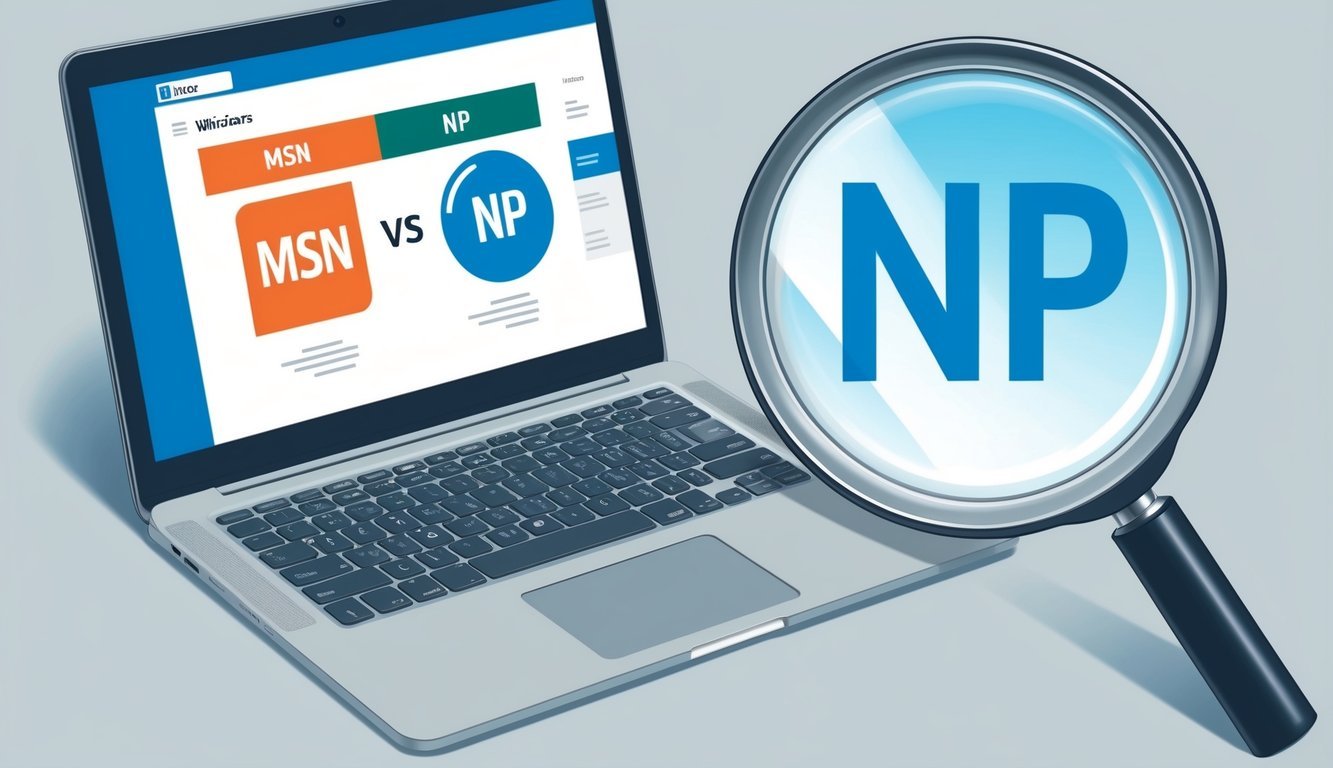Choosing between an MSN and an NP can feel overwhelming. The main difference is that an MSN (Master of Science in Nursing) offers a broad scope of advanced nursing education, while an NP (Nurse Practitioner) is a specific role that allows you to provide patient care and prescribe medications. Understanding these distinctions can help you make a better decision about your future in nursing.
Both degrees require commitment and dedication, but they lead you down different career paths.
An MSN can open doors in various nursing specialties, including education and administration.
On the other hand, becoming an NP enables you to take on clinical roles with responsibilities that include diagnosing and treating patients, filling a vital need in healthcare.
As you contemplate your options, knowing how your educational pathway can impact your career choices is essential.
The right degree can align with your career goals and aspirations, ensuring you make a meaningful difference in the lives of patients.
Key Takeaways
- An MSN provides a broader nursing education, while an NP focuses on patient care.
- Educational pathways for MSN and NP differ significantly in scope and length.
- Choosing the right degree can enhance your career potential in nursing.
Overview of MSN and NP Degrees
If you’re exploring advanced nursing degrees, understanding the distinction between the Master of Science in Nursing (MSN) and the Nurse Practitioner (NP) degree is essential.
Both paths offer unique opportunities and responsibilities in the healthcare field.
Master of Science in Nursing (MSN)
An MSN degree is designed for registered nurses (RNs) seeking to expand their knowledge and skills.
This advanced nursing degree often emphasizes clinical practice, leadership, and management.
Key components of an MSN program include:
- Curriculum Focus: Courses may cover advanced nursing theory, healthcare policy, and evidence-based practice.
- Duration: Typically takes 1-2 years to complete for RNs already holding a Bachelor of Science in Nursing (BSN).
- Career Opportunities: Graduates can work in various roles, including nurse educators, clinical nurse leaders, and nursing administrators.
For more detailed information on MSN programs, you can visit resources like Goodwin College.
Nurse Practitioner (NP) Degree
The NP degree is a specialization within the MSN program, specifically tailored for nurses who want to provide direct patient care.
NPs can diagnose conditions, interpret diagnostic tests, and initiate treatment plans.
Notable aspects of the NP degree include:
- Specialization: NPs may focus on areas such as pediatrics, family practice, or geriatrics.
- Licensing: After obtaining their degree, NPs must pass a certification exam to practice.
- Salary Potential: According to the Bureau of Labor Statistics, NPs earned an average annual salary of about $120,680 in 2021.
For further insights on pursuing an NP degree, consider checking Nurse.org.
Roles and Responsibilities

In nursing, understanding the distinct roles of Master of Science in Nursing (MSN) graduates and Nurse Practitioners (NPs) is crucial.
Each path offers unique opportunities in patient care and contributions to healthcare policy.
Clinical Practice and Patient Care
As an advanced practice registered nurse (APRN), your primary role focuses on providing high-quality patient care.
In clinical settings, both MSN graduates and NPs perform assessments, diagnose conditions, and develop treatment plans.
MSNs often work in leadership or administrative roles, overseeing nursing staff and improving practices.
They may also contribute to clinical practice through research and education.
In contrast, NPs are hands-on providers who often serve as primary care providers.
They have the authority to prescribe medications and manage treatment for various conditions.
Many NPs specialize in areas such as family medicine, pediatrics, or geriatrics, allowing them to cater to specific patient needs.
Leadership and Healthcare Policy
In leadership roles, MSN graduates are well-positioned to influence healthcare policy.
You might engage in creating guidelines that impact nursing practices and patient care standards.
Your responsibilities could include training new nurses and advocating for patient safety initiatives.
MSN-equipped leaders often work as nurse educators, preparing the next generation of nurses to meet modern healthcare demands.
On the other hand, NPs can also take on leadership roles, particularly in clinical settings.
They can influence policy by participating in decision-making processes and representing nursing perspectives in healthcare settings.
Both roles require strong communication skills to advocate effectively for patients and the nursing profession.
This involves collaborating with multidisciplinary teams to improve healthcare delivery and outcomes.
Educational Pathways

Understanding your educational options is essential for advancing your nursing career.
The pathways you choose can lead to various roles and responsibilities within the healthcare field.
Nursing Education Progression
Your journey typically starts with an Associate Degree in Nursing (ADN) or a Bachelor of Science in Nursing (BSN).
An ADN usually takes about two years, while a BSN takes around four years.
After obtaining your initial degree, you can pursue a Master of Science in Nursing (MSN).
This degree prepares you for specialty roles like Nurse Practitioner (NP), or even positions in administration and education.
If you aim higher, consider a Doctor of Nursing Practice (DNP) program.
The transition from MSN to DNP is becoming common, as it opens doors to leadership roles in healthcare.
Many DNP programs offer online formats, making it flexible for working nurses.
For more information, explore nursing education options.
DNP Programs and Curriculum
DNP programs are designed for advanced practice roles.
They focus not only on clinical expertise but also on leadership, research, and health policy.
Courses in DNP programs may include advanced pharmacology, health systems management, and evidence-based practice.
These subjects prepare you for complex decision-making in patient care and administration.
Most DNP programs require a BSN or MSN for admission.
The duration can range from three to four years, depending on whether you enroll full-time or part-time.
Some programs have clinical hours as a requirement, giving you hands-on experience.
To explore more about DNP programs, check out DNP vs.
MSN.
Career and Salary Outlook
In the nursing field, understanding salary and career advancement options is essential for making informed choices.
A clear salary comparison will help you assess your potential earnings, while knowledge of advancement opportunities can guide your career path.
Salary Comparison and Expectations
When comparing salaries, there are significant differences between MSN-prepared nurses and nurse practitioners (NPs).
According to recent data, the median annual salary for registered nurses is approximately $81,220.
In contrast, advanced practice registered nurses (APRNs), which include NPs, often earn around $125,900.
Moreover, specific NP specialties can offer even higher pay.
For instance, acute care nurse practitioners can earn salaries upwards of $157,580.
In contrast, specialties like women’s health and orthopedic nursing generally see lower salaries, around $101,569 and $100,035 respectively.
Your specific role, experience, and location will influence your total salary potential.
Advancement Opportunities
Advancement opportunities for nurses vary greatly based on their qualifications and experiences.
With an MSN, you have the chance to move into management or specialized roles.
Pursuing a Doctor of Nursing Practice (DNP) can further enhance your career options, leading to positions in leadership, education, or clinical practice.
Many organizations offer programs for professional development, providing pathways to advance your skills.
For instance, dual-track programs allow you to qualify as both a family nurse practitioner and a psychiatric-mental health nurse practitioner.
This flexibility not only increases your marketability but also boosts your earning potential as you expand your skill set.
Specializations and Clinical Settings

As a nursing professional, understanding the various specializations and clinical settings is crucial.
These factors can significantly impact your career path and the type of care you provide.
Advanced Practice Nursing Specialties
Advanced practice nursing offers numerous specialties that allow you to focus on specific patient populations or healthcare areas.
Some common roles include:
- Family Nurse Practitioner (FNP): Provides comprehensive healthcare for individuals and families across all ages.
- Pediatric Nurse Practitioner (PNP): Specializes in the care of infants, children, and adolescents.
- Adult-Gerontology Primary Care Nurse Practitioner (AGPCNP): Focuses on health issues for adults and older adults.
- Psychiatric Mental Health Nurse Practitioner (PMHNP): Delivers mental health care and treatment.
- Neonatal Nurse Practitioner (NNP): Works with newborns, especially those needing specialized care.
- Certified Registered Nurse Anesthetist (CRNA): Provides anesthesia care in various surgical settings.
Each specialty has unique training and certification requirements, often obtained through various nurse practitioner programs.
Working in Diverse Healthcare Settings
The variety of clinical settings in which you can work is wide-ranging.
These include:
- Primary Care Clinics: Focus on preventive care and managing chronic conditions.
- Hospitals: Engage in critical care and emergency services.
- Long-Term Care Facilities: Cater to the elderly and those with chronic illnesses.
- Home Health Care: Provides services in patients’ homes, emphasizing personalized care.
- Mental Health Facilities: Address the psychological and emotional needs of patients.
Your choice of setting can influence patient interactions and treatment approaches.
Understanding these environments helps tailor your practice to meet the needs of diverse patient populations effectively.
Frequently Asked Questions

There are many details to know about the differences between an MSN degree and being a Nurse Practitioner (NP).
This section addresses common questions about salary, scope of practice, transition periods, benefits of advanced degrees, and available programs.
What are the salary differences between an MSN and an NP?
Salaries can vary depending on your role and experience.
As of May 2021, Nurse Practitioners earned an average of $120,680 annually.
If you hold an MSN but do not work as an NP, your salary may be lower, depending on your specific job responsibilities.
How does the scope of practice compare between an MSN and a DNP?
The scope of practice can differ based on your specific role.
While both MSN and DNP degrees prepare you for advanced practice, a DNP often allows for broader responsibilities and leadership opportunities in healthcare settings.
This includes more involvement in policy-making and clinical practice innovation.
How long does it typically take to transition from an MSN to an NP?
The time required to transition from an MSN to an NP can vary.
Generally, it takes about 1-2 years of additional study to complete the necessary coursework and clinical hours needed for NP certification.
Each program may have different requirements that can affect this timeline.
What are the benefits of obtaining a DNP over an MSN for nurse practitioners?
Choosing to pursue a DNP can offer several advantages.
DNP programs often provide advanced training in evidence-based practice, which can enhance your clinical skills.
Additionally, a DNP may open doors to higher-level roles in administration or teaching, potentially leading to higher earnings.
What level of nursing is achieved with an NP title?
An NP title means you have attained an advanced practice registered nurse (APRN) status.
This allows you to diagnose and treat patients, prescribe medications, and manage health conditions within your specialty area.
It reflects a higher level of education and training compared to registered nurses.
Are there online programs available to go from MSN to NP, and how effective are they?
Yes, many institutions offer online programs for MSN to NP transitions.
These programs can be effective.
They allow you to complete coursework and clinical training at your own pace.
It is important to choose accredited programs to ensure quality education and meet certification requirements.
For example, Drexel University offers various online NP certificates that are well-regarded in the field.

